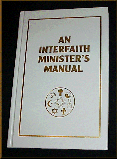Bishop James, our Dean of Students at the Seminary, found this link to the New Minister’s Manual. He writes: It is an excellent resource. As with many internet resources, shelf life is unpredictable, and you should save it if you are interested. +James http://www.vfwofwa.org/Announcements/state_chaplain/ministers_manual.pdf
He means the manual above is currently a free PDF, but we don’t know how long the authors will continue to so generously make it available.
Several of the ministers and clergy in our network of graduates, including me, immediately downloaded and started to use this new manual. One ordained minister pointed out the manual is not as inclusive as it could be, is Christian-only, not Interfaith. She made a good point.
 For the past twenty plus years as we ordain ministers, rabbis and other clergy of all callings and faiths, we offer them the Interfaith Minister Manual pictured right. I think both these minister manuals are a good addition to one’s library. Now that I think about it, I should photograph my shelf of clergy manuals here at the Seminary. This “collection” compiled over the past quarter century now takes up two shelves on their own, and that does not include all the other liturgy and ceremony / ritual books. Does anyone else “collect” minister manuals? We have long considered putting a minister manual online somehow, or at least a compilation of religious ceremonies, rites of passage, etc. We used to have some nice funeral ceremony “templates” and of course a bunch of wedding ceremonies online back in 1999 and 2000 when the Seminary first went online. Wonder what happened to those.
For the past twenty plus years as we ordain ministers, rabbis and other clergy of all callings and faiths, we offer them the Interfaith Minister Manual pictured right. I think both these minister manuals are a good addition to one’s library. Now that I think about it, I should photograph my shelf of clergy manuals here at the Seminary. This “collection” compiled over the past quarter century now takes up two shelves on their own, and that does not include all the other liturgy and ceremony / ritual books. Does anyone else “collect” minister manuals? We have long considered putting a minister manual online somehow, or at least a compilation of religious ceremonies, rites of passage, etc. We used to have some nice funeral ceremony “templates” and of course a bunch of wedding ceremonies online back in 1999 and 2000 when the Seminary first went online. Wonder what happened to those.
So many of our clergy create their own ceremonies these days that not too many want to follow along a set “script”. However, doing so is much easier when you can cut and paste, pick and choose elements from a minister manual or wedding ceremonies you find online. With the help of the bride and groom, a wedding officiant usually customizes the ceremony by using all these minister tools. That reminds me of one of the little known ancient meanings of the word ordination. It means “to have the tools placed in hand” by the Divine. In the Hebrew Bible (Christian Old Testament) we find the first use of the word ordination. God would ordain priests, clergy, etc. by placing “tools” of the ministry in their hands. They were empowered, ordained, set to work. Our formal Certificate of Ordination uses an old turn of phrase, “Ordained to the work of ______________ Minister”. The minister or clergy title such as Interfaith Minister, Chaplain, Spiritual Minister, Rabbi, Priest goes in there.
Being clergy is a special kind of work (with tools handed down from on High!). Some would say it is the Great Work.
+Katia
